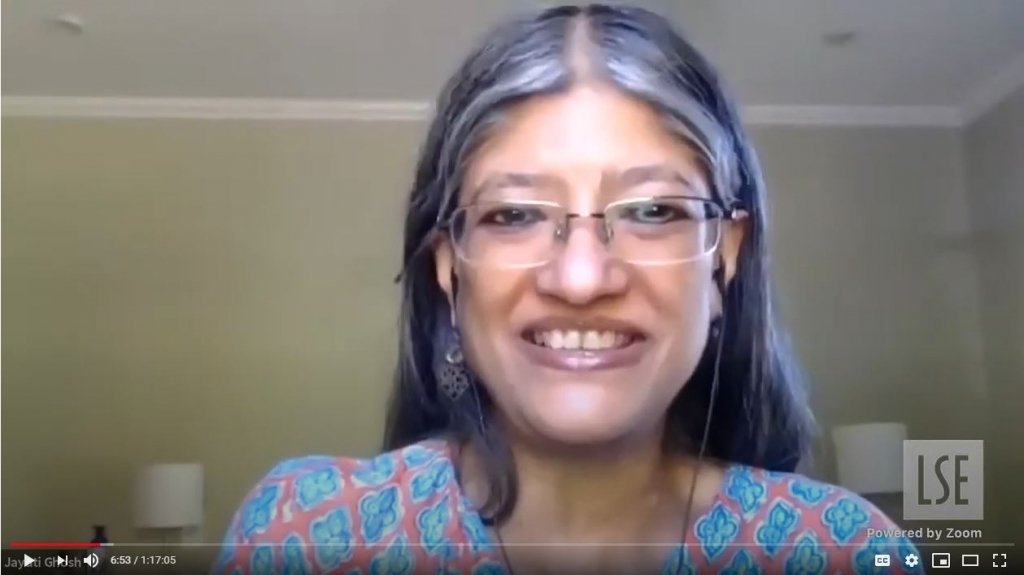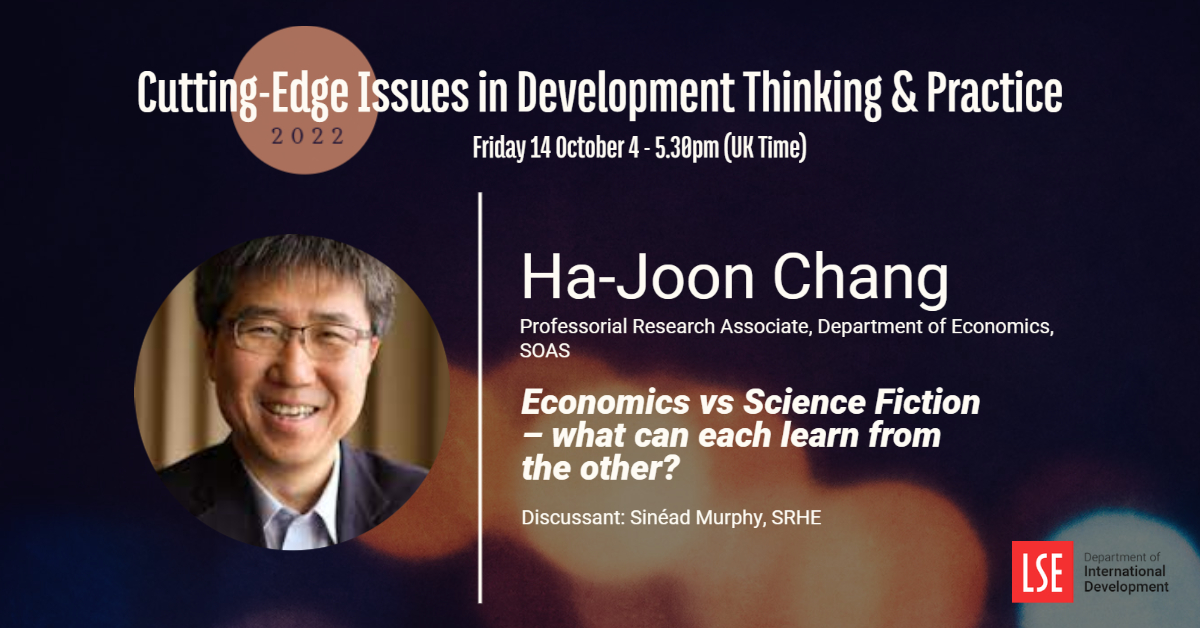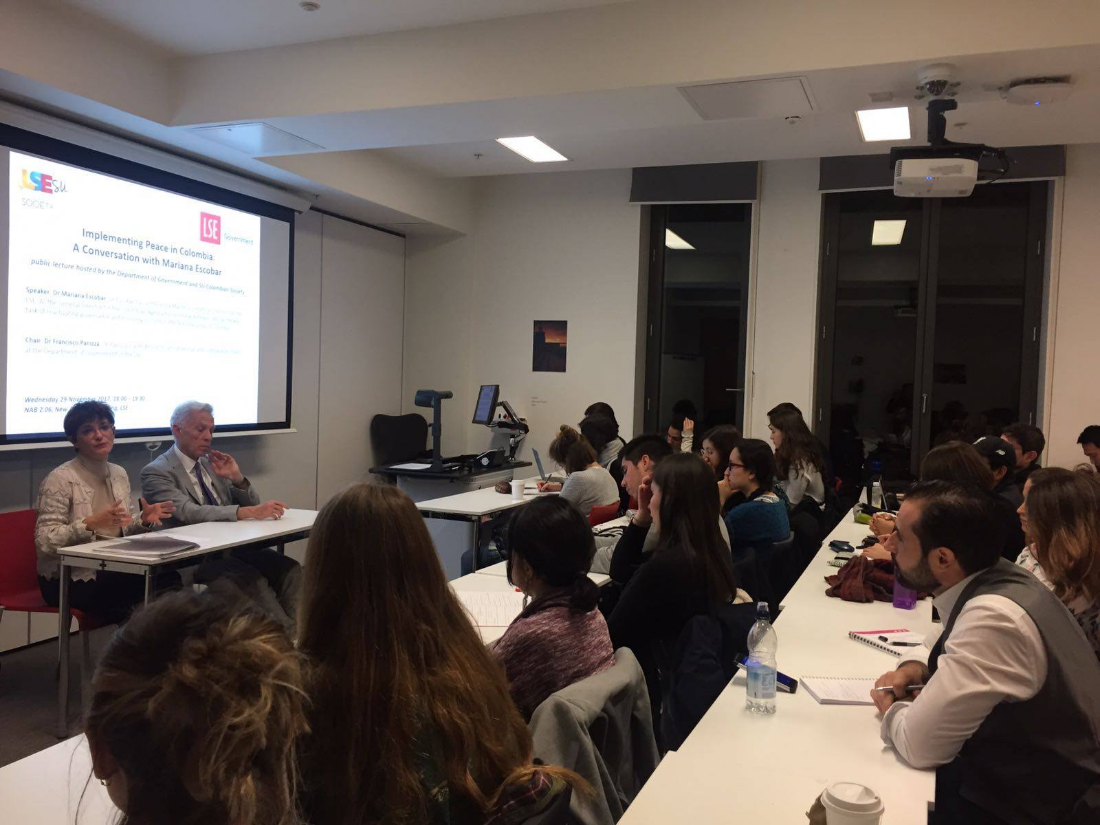On Friday 9 October, Professor Jayati Ghosh delivered an online lecture on “The Pandemic and the Indian government’s response”, the first for the department’s Cutting Edge Issues in Development lecture series. Jayati Ghosh is Professor of Economics at the Centre for Economic Studies and Planning, School of Social Sciences, Jawaharlal Nehru University, New Delhi. Read more about what our students took away from her lecture below.
You can watch the guest lecture back on YouTube.

On the evening of March 23rd 2020, India – a nation of 1.3 billion ethnically, religiously, and economically diverse citizens spread across 29 states – plunged into one of the most unprepared and stringent lockdowns in the world, giving its citizens under four hours to prepare for the unforeseen measures restricting civil life even today. Despite enforcing a lockdown with less than 1,000 nationwide cases of COVID-19, Jayati Ghosh illuminates 10 aspects which explain how the world’s largest democracy failed its citizens and exacerbated the contagion.
The economist largely discussed the implications of the limited social protection India has to offer its informal workers – who account for 93% of the workforce. Millions of citizens are low-income, daily-wage earners who have been left abandoned and traumatised by the lockdown, and with formal unemployment aid and universal health coverage a “distant dream”, over half of India’s workers remain ineligible for social security benefits of any kind. National news and accounts across social media callously revealed the consequences of this, as mass starvation, suicides and distraught devoured India’s largest demography.
Jayati also discussed the unwarranted centralisation of measures and lack of coordination with state governments when the lockdown was enforced in March using the draconian ‘Disaster Management Act’ of 2005 – which enables the central government to overpower any law in force and issue directions to any authority in India. Whilst the subsequent lockdown phases gradually restored varying levels of authority to state governments, ‘lockdown 1.0’ resulted in states scurrying to self-reliantly mobilise financial and healthcare-related resources overnight, and SMEs across the country failing to plan and strategize their revenues. An intriguing comment was also expressed in this discussion, regarding the performative dimension of the lockdown. The dialogue suggested that these abrupt, unanticipated decisions could be spectacles designed to induce a sense of ‘power’ and implicit autocracy over the nation – similar to the socioeconomic tremors of demonetisation and the revocation of Article 370, stripping Jammu and Kashmir of its autonomy. On a related note, as Modi frequently urged the nation to demonstrate solidarity during isolated times through the nation’s weekly displays of “Janta Curfews” , it further implores us to question his silence when communal riots and violence against academics engulfed the democracy’s capital, only weeks earlier.
Conclusively, the most significant of the 10 comprehensive aspects was Ghosh’s brief argument of why the tactics executed were rife with class, caste, and gender biases, and how the suppression of information breached democratic rights. Additional research also presents instances of communal biases, as distressing footage revealed local police attacking worshippers outside a mosque in the state of Karnataka, whilst the Hindu majoritarian diaspora rushed to communalise the pandemic by condemning Muslims for the spread of the contagion. Caste and class frictions also surfaced as the government swiftly arranged for chartered flights to bring Indians from across the world back home as millions of low-income workers endangered their lives to trudge hundreds of miles for months. Equally, a further violation of democratic rights was uncovered as the government refused to disclose the expenditure of the $1.2 billion donated by philanthropic Indians to the ‘PM Cares’ COVID-19 fund.
Thus, with institutional abandonment and humanitarian atrocities unfolding every minute, it is inevitable for disadvantaged, uninformed citizens to feel compelled to return to work, despite the threat of COVID-19 continuing to rise exponentially. As inclusive, democratic governance falters, we are forced to stand by and observe a harrowing episode in which the downtrodden populace needs a source of livelihood to survive – even if it is at the cost of catching and transmitting the fatal disease.
Though, Ghosh expresses:
“India will ultimately survive this. There will be change; a new social contract is on its way. As (Arundhati) Roy said, ‘on a quiet day, I can even hear her breathing’”.
Ritika Arora
_______________
On Friday, 9th October, Jayati Ghosh delivered her talk about the Indian government’s response to the pandemic, setting an extremely high standard for the remaining talks in the Cutting Edge Issues in Development series.
In her poignant introduction, Ghosh characterised the Indian government’s actions as a “classic example of what not to do”.
The Indian government placed its entire population into a national lockdown, with 4 hours notice on the 23rd March. What Ghosh described as merely performative action from the government, she criticised not only the contributive element of a visionless lockdown to more Covid deaths, but importantly the consequence of an immeasurable amount of deaths independent of the disease that occurred due to lockdown related reasons. This was enabled by the poverty and hunger that followed a massive collapse in the informal economy accompanied by little help nor guidance from the federal government towards state governments upon the announcement of lockdown. Resultantly, huge swathes of the population were left without any protection or basic resources such as food.
Personally, Ghosh’s focus on the social implications truly hailed my attention. Alarmingly, the lockdown imposed upon road and rail traffic, and walking affected its most vulnerable citizens. Migrants from different states had little choice in their next move, with some resorting to walking across states with little resources to make the journey alive. Disturbingly, despite having 752 tonnes of ‘buffer’ stock of foodgrain, only 2.2 million tonnes were delivered to India’s inhabitants. The huge wealth of grain left in stocks was eventually converted into ethanol for the use of hand sanitisers. In a cruel twist of mismanagement, the very food that could have been used to help millions of citizens, if it was handled properly, was exported. Critically, Ghosh points out the classist features of the guidelines by the government. The frequent washing of hands regularly and ‘physical’ distancing simply isn’t possible in the cramped conditions of urban areas, suggesting that lockdown has only exacerbated existing social impoverishment. Moreover, the blame of Muslims for the virus demonstrated the ever-growing Hindu nationalism of Modi’s country.
It was difficult to not feel angered when Ghosh spoke of the freight trains which were allowed to operate to deliver essential goods, which failed to include female sanitary products. The patriarchy undoubtedly made itself known during the pandemic, with a rise of domestic violence cases occurring across India and globally and thus it is crucial to explore the lockdown through a gendered framework also.
Ghosh’s talk was dynamic. Her emphasis on just how deep the cracks of social and economic equality seep in India has raised critical points about gender, religion and social status. Importantly, Ghosh demonstrated how India’s lockdown has exacerbated its ugliest features.
Amy Hegedus
_______________
The year 2020 brought with it an unprecedented and previously unimaginable challenge – the Corona Virus Pandemic. We cannot think about development anymore without taking into account this massive elephant in the room. Therefore, the talk by eminent economist Jayati Ghosh on India – the world’s largest democracy’s response to the pandemic was an appropriate start to the Cutting Edge Lecture Series.
The pandemic has shaken even the countries that have deeply institutionalised democracies, says Ghosh. It has a tendency to induce in people a sense of fear that makes them grant to their Government more surveillance power than they normally would. It weakens the channels of accountability and drives regimes towards authoritarianism.
The Indian Government’s Response, in her words, gives important lessons to all the countries on what not to do. With barely 4 hours of notice, the Government imposed a nationwide lockdown – one that was the world’s most stringent – heavily curtailing mobility, and being ignorant to the lived realities of a majority of its population. Yet the country has among the highest number of cases in the world with no foreseeable decline in the near future.
As a volunteer on an NGO’s Covid-19 relief helpline, I had first-hand experience hearing the pain that the lockdown caused the migrants, driving them to take unthinkable decisions like walking thousands of kilometers to get back home. It left many stranded, cutting away their source of livelihood without any extra measures of social protection. This had disastrous consequences in a country where around 90% of the workforce is informally employed and more than half of the workers have no access to any form of social security even under public schemes. They were left to the mercy of past savings, and to starve if those washed out.
The effect on the already fragile economy, too, has been extremely severe, making recovery very difficult. The relief package announced by the Government was wanting with minuscule public spending including in public health systems. Rather the focus was on increasing liquidity which proves futile in the absence of demand. There was a breakdown of coordination between the centre and the states with decision making under the Disaster Management Act being centralised, but responsibilities of handling the situation left to the states with meagre funding. Caste, class and gender vulnerabilities loom large in the Indian context and the pandemic and the policy response have differentiated effects.
Ghosh added that the large-scale reverse migration brings with it many possibilities as people go back to rural areas with different knowledge, level of acceptances and personal identities. She concluded what was an extremely thought-provoking talk on an optimistic note by saying that change doesn’t come from the direction we expect but in all directions. Quoting Arundhati Roy, she added, “A new world is coming, and on a quiet day, you can even hear it breathe”.
Aishwarya Rebelly
This Friday’s guest lecture will be with Professor Danny Quah, who will be joining us from Singapore to talk about Global Power Shift to Asia: Great Power Competition in the Marketplace for World Order. LSE staff and students can sign up for the lecture here. External audiences can join the lecture via YouTube.
The views expressed in this post are those of the author and in no way reflect those of the International Development LSE blog or the London School of Economics and Political Science.






2 Comments